Regional elections in the Balearic Islands, 28 May 2023
Issue
Issue #4Auteurs
Llorenç Soler-Buades , Pedro Riera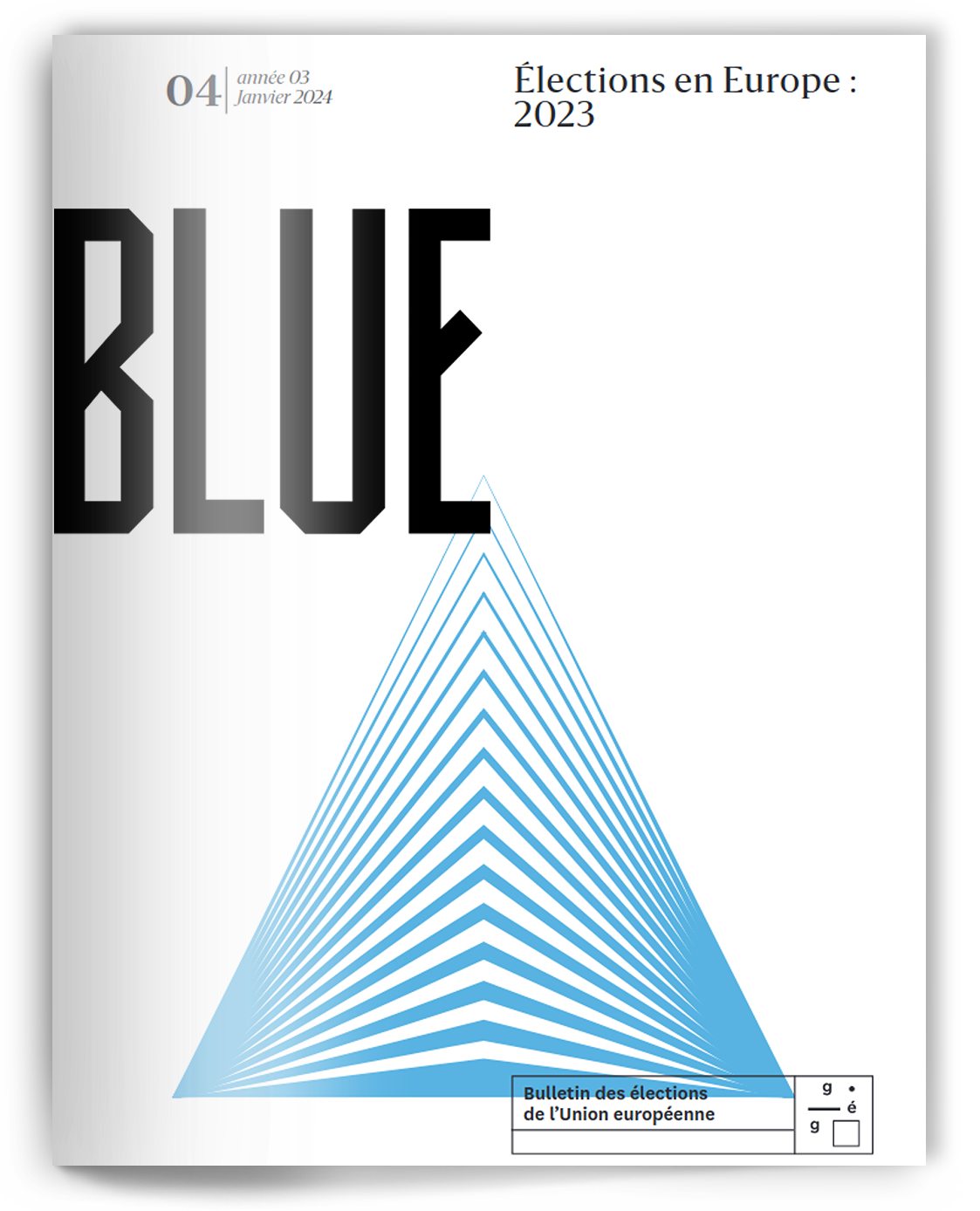
Numéro 4, Janvier 2024
Élections en Europe : 2023
Introduction
On the 28th of May of 2023, the eleventh regional elections since the return of democracy took place in the Balearic Islands. After eight years of center-left government, the Popular Party (PP, EPP) became the most voted party in the region and managed to form a right-wing minority cabinet with the support of the radical right party Vox (ECR). Two facts were largely responsible for this outcome: the overall unpopularity of the left-wing national government and the electoral collapse of, on the one hand, Ciudadanos (Cs, RE) and the PI (autonomist) and, on the other hand, Unides Podem (GUE/NGL), who obtained no seats and barely entered the regional Parliament, respectively. This report provides the most comprehensive summary to date of some of the most important explanatory factors of the 2023 May regional elections in the Balearic Islands by focusing on the role of the electoral and party system, the political context of the election (including the parties’ campaign strategies) and the election result.
Electoral and party system
Since 1986, the Balearic Parliament has 59 members (Law 8/1986). The regional deputies are elected in four districts that correspond to the four populated islands (in parentheses, the number of seats): Mallorca (33), Menorca (13), Ibiza (12) and Formentera (1). The Hondt method is used to allocate seats, and there is a 5% district-level threshold. Under this system, Mallorca is underrepresented, while the rest of the islands are overrepresented to different degrees. Notably, Mallorca, with nearly 80% of the population, elects 56% of the seats, while the remaining 44% of seats are devoted to representing the 22% of the total population who lives in Menorca, Ibiza, and Formentera. This institutional design aimed to ensure the fair representation of the interests of the smaller islands, thus mitigating the challenges posed by their double insularity and countering the tendency toward centralization and concentration of power and institutions in the largest island, Mallorca. This system has fostered a substantial consensus among political parties and the various islands that constitute the archipelago over the last 40 years. Moreover, it has effectively promoted the development of the Balearic autonomy while nurturing a harmonious coexistence among the islands — a key condition for forging a shared regional identity.
The Balearic party system has always been characterized by the joint presence of statewide and non-statewide parties. Until 2019, the former group comprised the Partido Socialista Obrero Español (PSOE, S&D) and the Partido Popular (PP), as well as the two parties that emerged from the 2014-2015 political turmoil in Spain: Unidas Podemos (UP) and Ciudadanos (Cs). The PP stands as a historically dominant conservative party, having consistently secured the highest percentage of votes since the inaugural regional elections in 1983 with a single exception in 2019. Notably, its victories in 1991, 1995, 2003, and 2011 were so resounding that it achieved a parliamentary majority on its own. The PSOE, in contrast, has consistently occupied the second position in terms of vote share in the Balearic elections. However, it is worth highlighting that, despite the PP’s recurrent electoral success, left-wing parties (mainly the PSOE, IU, Podemos and PSM-Entesa/Més per Mallorca) managed to forge coalition governments in four instances (in 1999, 2007, 2015, and 2019).
In spite of the dominance of statewide parties, the Balearic party system is also characterized by the presence of important non-statewide parties. Like in other Spanish regions like Catalonia and the Basque Country, the territorial cleavage plays an important role in the Balearic Islands, having become one of the distinguishing features of its party system and one of the key factors behind the success of nationalist parties (Sánchez and Picanyol, 1998). Figure a displays the amount of attention devoted to territorial issues by each party over time. As expected, pro-decentralization demands and statements about the Balearic (or the islands’) identity have been more present in non-statewide parties’ manifestos, even though the overall trend is negative for all parties.
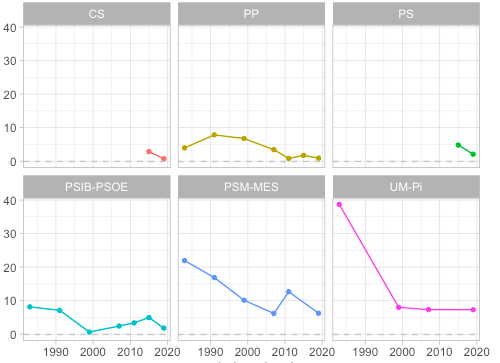
Figure a · Parties’ pro-decentralization demands and attention devoted to identitarian issues over time, Balearic Islands
Among the regional parties, the left-wing PSM-Entesa and the center-right UM — currently Més per Mallorca and Proposta per les Illes-El PI, respectively — have been key actors in the formation of regional governments since 1982 1 . According to Riera and Hernández (2019), these parties have had different stances regarding alliances with other parties, depending on their ideology and their weight in the party system. On the one hand, PSM-Entesa/Més per Mallorca has consistently been part of all four center-left coalition governments that have emerged during the democratic era. The electoral support for the party has remained rather stable over time, obtaining around 40,000 votes in all regional elections since 1995. On the other hand, UM-El PI reached several agreements with the PP during the first three legislative periods (1983-1995). However, its position shifted since then and the party supported left-wing coalition governments during the fifth and the seventh legislative periods. Compared to PSM-Entesa/Més per Mallorca, UM-El PI has traditionally garnered a smaller percentage of votes. This comparatively lower electoral support prompted its involvement in pre-electoral coalitions with the PP, due to either the risk of not meeting the electoral threshold or ideological considerations. This intermittent electoral support led to the party not being represented in the regional Parliament on two occasions (2011-2015 and 2023-).
The 2023 election context
In May 2015, a new political cycle started in the Balearic Islands. The PP, which had won the 2011 elections with a majority of seats, lost almost 50% of its vote share, falling from 46.7% to 28.5%. The low popularity rates of the regional Prime Minister, José Ramón Bauzá, who among other controversial policies attempted to at reduce the weight of Catalan in the educational system, led to the worst results in the PP’s history. The PSOE, Més per Mallorca and Més per Menorca managed to form a center-left coalition government with the parliamentary support of Podemos. In the 2019 elections, the PP’s results further deteriorated, with the party obtaining “only” 22% of the vote. The strong performance of the liberal party Ciudadanos (10% of the vote) and the breakthrough of the radical right Vox (8.1% of the vote) made it even more difficult for the PP to achieve a good result after 4 years of a center-left government. In contrast, the PSOE increased its vote share from 19% to 27%, obtaining five more seats than in 2015. The main allies of the Socialist Party, Més per Mallorca and Podemos, saw a decrease in their vote share by about 6%, and their position was weaker when the new coalition government was formed.
This latter phenomenon is not exceptional in Spanish regions. As Font (2001) points out, the main partner in a coalition government tends to gain electoral ground during its time in office, while minor coalition partners often suffer electoral losses. In this regard, there are some indications suggesting that voters do not like situations when small parties make governing complicated by not playing their expected role as minor partners. However, the reasons for this pattern are not entirely clear and may be different in each case depending on the political context. In the Balearic Islands, the strong leadership of the regional Prime Minister between 2015 and 2019, Francina Armengol, could have fostered such an outcome. Francina Armengol (PSOE) was the most well-known leader, with only 3.6% of the citizens stating that they did not know her, but also the most popular, gaining 0.4 points compared to 2015 (CIS, 2019).
Against this backdrop, PSOE and Més per Mallorca formed a new center-left coalition government between 2019 and 2023, being joined by Unides Podem in the new executive. In contrast, Més per Menorca did not enter the cabinet. The period from 2019 to 2023 witnessed a stable coalition government that adeptly navigated the challenges posed by the Covid-19 crisis. The government extended the social safety net without facing any significant problems that would have put the cabinet’s survival at risk. The main noteworthy aspect in this regard may be the greater loyalty of Podemos towards the Socialist leadership, as compared to the position taken by Més per Mallorca, which expressed a more critical stance towards certain policy interventions.
The 2023 election campaign
The polls prior to the 2023 regional elections foresaw a clear victory of PP, placing the Conservatives well ahead of PSOE, a 13% of electoral support for the radical right party Vox, and a predicted vote share of about 10% and 8% for Més per Mallorca and Unides Podemos, respectively. The Gadeso poll conducted on May 15th (Diario de Mallorca, 2023) predicted an overall tie between the left and the right blocks: 28 deputies for PP and Vox and 29 deputies for PSOE, Més per Mallorca, UP and Més per Menorca. In that case, the PI would have become the kingmaker. In contrast, the IBES poll of May 18th predicted 30 deputies for the right (PP and Vox), which would have given a majority of seats to these parties. Overall, the election was quite competitive, with the polls warning about a potential wear of the center-left coalition that had been governing for the last 8 years. The polls also indicated that both El PI and Ciudadanos were struggling to reach the necessary threshold of 5% of the votes at the district level needed to obtain parliamentary representation.
The parties focused on different issues during the campaign. The PSOE, as senior member of the outgoing coalition government, emphasized the quality of its crisis management during the 2019-2023 term, the achieved levels of economic prosperity and job creation over these years, and the need to consolidate a solid government project by continuing the “work done” (PSOE, 2023). Its coalition partner Més per Mallorca focused on housing policies, the protection of the Catalan language, the need of lowering the number of tourists in the region, and the expansion of self-government. Regarding the latter point, Més per Mallorca candidate Lluís Apesteguia underscored the imperative of establishing a new framework for the political relations with the central state, based on the principles of bilateralism and fiscal sovereignty. Finally, Unides Podem highlighted its essential contribution to social progress as a coalition partner and the necessity of continuing in such a role in the next four years. Its campaign was centered on issues such as universalizing the access to affordable housing, developing public services, promoting sustainable mobility and free public transportation.
As the main opposition party, the PP structured its communication around the alternative between embracing freedom and increasing public interventionism. In terms of policy, it primarily emphasized tax reduction, streamlining bureaucracy, and the pursuit of a “more human” approach to public healthcare, with a specific focus on increasing the number of medical doctors and reducing waiting lists. Additionally, the party underscored the importance of safeguarding private property and preserving the region’s traditions and cultural heritage. The radical right Vox followed its national line, advocating anti-immigration policies and vigorously opposing the “separatists” whom it accused of seeking to disintegrate Spain. More specifically, its campaign revolved around opposing the use of Catalan within the region’s institutions, administration, and schools. Finally, the leader of El PI, Josep Melià, presented his party as “decisive” for the composition of the new government, being confident of holding “the key” of governability for the next four years. El PI, thus, offered itself as the alternative in a context of increasing polarization, giving citizens the choice between “a government whose policies are shaped by extremists” and “a government characterized by centrality and moderation”. Some of the specific issues put forward in its campaign were housing, quality tourism and better equipped education and healthcare services.
The 2023 election results
The results confirmed some of the patterns anticipated by the pollsters. First of all, the PP comfortably won the elections with a vote percentage of 34.16%, that is, almost 11 points ahead of the PSOE. With 23.56% of the votes, the Socialist Party almost obtained the same results as four years ago. Més per Mallorca also withstood the conservative wave, losing less than 2,000 votes (just over 1%). UP, on the other hand, suffered an unprecedented electoral collapse. This left-wing coalition lost 50% of its votes and was left out of the distribution of seats in the main district (Mallorca), since it obtained only 4.4% of the vote in the island. Finally, El PI and Ciudadanos performed very poorly (3.8% and 1.4%, respectively) and lost all their seats.
What were the drivers of the PP victory in 2023? Although the causes of this right-wing turn are still being discussed, and there is no conclusive empirical evidence in this regard yet, it is clear that, at least in the Balearic Islands, the Popular Party benefited from higher turnout rates in some areas, particularly in Mallorca and Menorca (El Diario, 2023), and the “demise” of Cs and El PI.
Ciudadanos, which entered into the Balearic Parliament in 2015 with 6% of the vote and two seats and improved its electoral results in 2019 with 10% of the vote and five seats, virtually disappeared from the political landscape in 2023. As we can see in “the data”, Cs only obtained 1% of the vote on that occasion, becoming a residual party. The fall of Ciudadanos has not only occurred in the Balearic Islands, but also in the rest of the regions where elections were held on the 28th of May. The regionalist center-right party, El PI, fell slightly from 8% of the vote in 2015 to 7.3% of the vote in 2019. On both occasions, El PI obtained three seats. Notwithstanding these good results in the past, the party suffered an electoral debacle that left it out of the regional Parliament in 2023, reaching only 3.7% of the vote. This might have benefited the PP.
Although the fall of Ciudadanos can be linked to country-level dynamics, the electoral debacle of El PI is due both to political change within the right-wing camp in the Balearic Islands and to internal party dynamics. Regarding the former, Muñoz (2012) points out that, especially in those regions that have their own language and weak nationalist movements (that is, mainly in Galicia, the Balearic Islands, and Navarre), the PP has historically expressed “autonomist enthusiasm” – penetrating through a regionalist discourse. Muñoz (2012: 53) states in this regard that this type of regionalism has served in part to reduce the expansion of conservative nationalist parties in the territories where weak peripheral nationalisms exist. Along these lines, when the Popular Party has resorted to electoral platforms focused on regional identity, UM (previously) and El PI (currently) have found it more difficult to attract center-right regionalist voters. In this regard, the political profile of the PP candidate in 2023, Marga Prohens, a Catalan speaker with a certain regionalist sensibility, may have attracted voters from this political space.
Furthermore, certain internal dynamics have negatively affected El PI. Antoni Amengual, who was El PI’s leader after the previous regional elections, resigned in 2021 due to the “disloyalties” of other party leaders. In this context, Josep Melià assumed the leadership of the party, and internal dynamics have been difficult to manage since then. The PP has thus probably benefited from the collapse of both Ciudadanos and El PI, which have disappeared from the political map in the 2023 elections, leaving 18% of the vote to be re-distributed on the right wing of the ideological spectrum.
Another key factor in this election has been the rise of the radical right party Vox, which has increased its total vote percentage from 8% to 13.9% (about 28,000 extra votes). This fact has allowed Vox to obtain a total of eight seats, an increase of five seats compared to 2019. This important presence of the radical party in the regional chamber has forced the PP to negotiate an investiture agreement and to elect a Vox MP as Speaker of the Chamber. In exchange for its support in the investiture of the leader of the PP, Marga Prohens, as regional Prime Minister, Vox has succeeded in incorporating several key issues into the government’s agenda. These include the repeal of laws enacted over the past eight years by the previous center-left regional administrations, which focused on the rights of the transgender community and the recognition of victims of the Franco dictatorship. Furthermore, a comprehensive plan will be implemented to address illegal immigration and the issue of squatters.
The rise of Vox takes place against the backdrop of an overall increase in radical right support across Spanish regions in the 2023 elections. How can this electoral growth be explained? While there is no definitive empirical evidence on the causes of this growth, some experts point out that the context in which these elections were held was favorable to the radical right. In this sense, the electoral campaign mainly revolved around two issues traditionally put forward by the right: the friendly relationship of the Socialist Party and Unidas Podemos with the secessionist parties, and the negative consequences of the so-called and gender-related “Only yes is yes” and “transgender” laws. With regard to the latter, there is some evidence showing that the salience of these issues can trigger the electoral growth of radical right parties (Anduiza and Rico 2022: 14).
On the left side of the ideological spectrum, PSOE and Més per Mallorca maintained results similar to those of 2019. The PSOE secured 26% of the vote, a 1% decrease compared to 2019, while Més per Mallorca saw a slightly smaller drop of 0.9 points compared to its 2019 performance. The results, however, were notably more negative for Podemos, as the party failed to surpass the 5% electoral threshold in the largest district, Mallorca, and managed to secure only one seat in Menorca. This means a substantial decline for this left-wing party, which lost 50% of its votes compared to the previous election. This collapse was in line with broader national trends: Unidas Podemos experienced significant losses not only in the Balearic Islands but across the entire Spanish territory in the 2023 regional elections. In “the data”, we can observe the final composition of the Balearic Parliament according to European political groups.
Conclusions
After eight years of center-left governments, in 2023 the Popular Party managed to regain control of the regional government of the Balearic Islands with the support of the radical right party Vox. This report has delved into the specificities of the regional elections that provoked the mentioned government turnover. This outcome was due to two main factors. On the one hand, most center-right wing citizens that had voted for Ciudadanos in 2019 opted for the PP in 2023. On the other hand, two parties that would have probably supported the formation of a center-left government at the regional level, Unides Podem and El PI, obtained no seats in the largest electoral district (Mallorca). Whereas the collapse of Ciudadanos and the poor results of Unides Podem were largely explained by national-level factors, turning the 2023 regional elections as one of the most nationalized ones to date (Garmendia and Riera, 2024), El PI’s poor electoral performance was caused mostly by regional-level dynamics.
The data
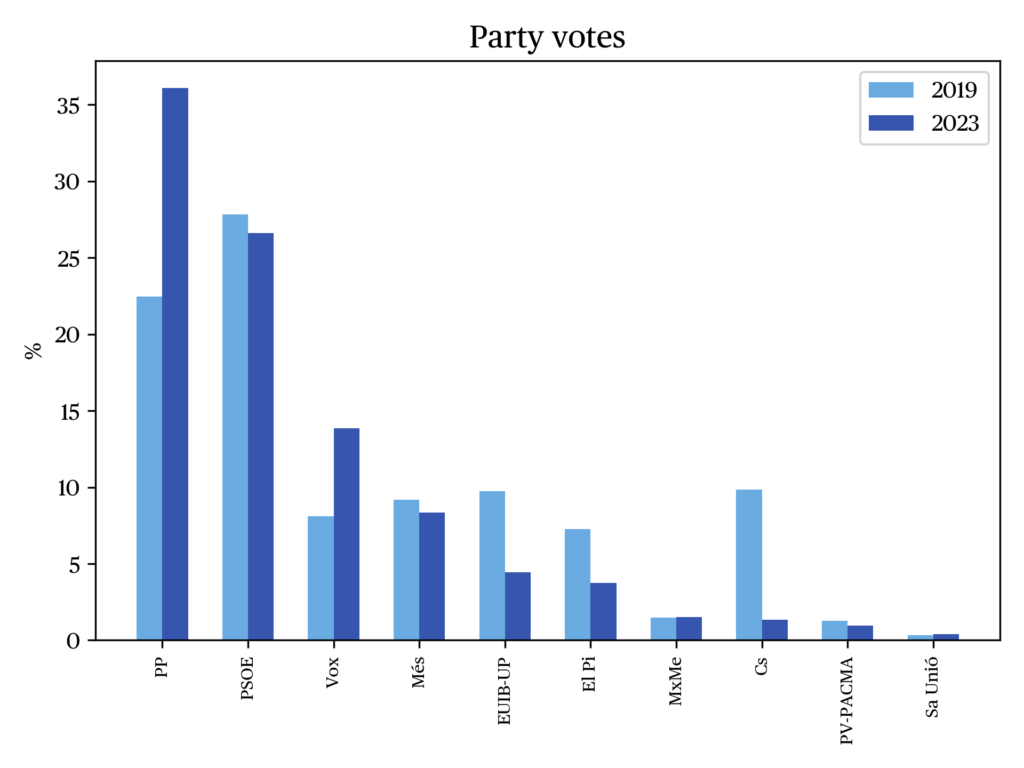
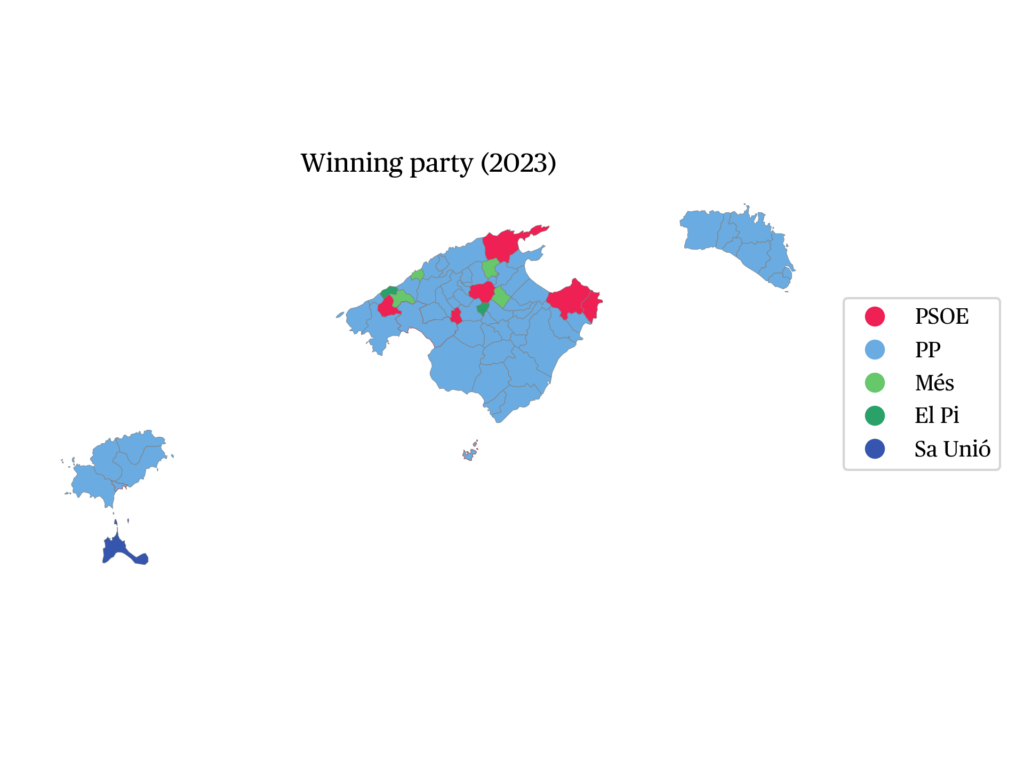
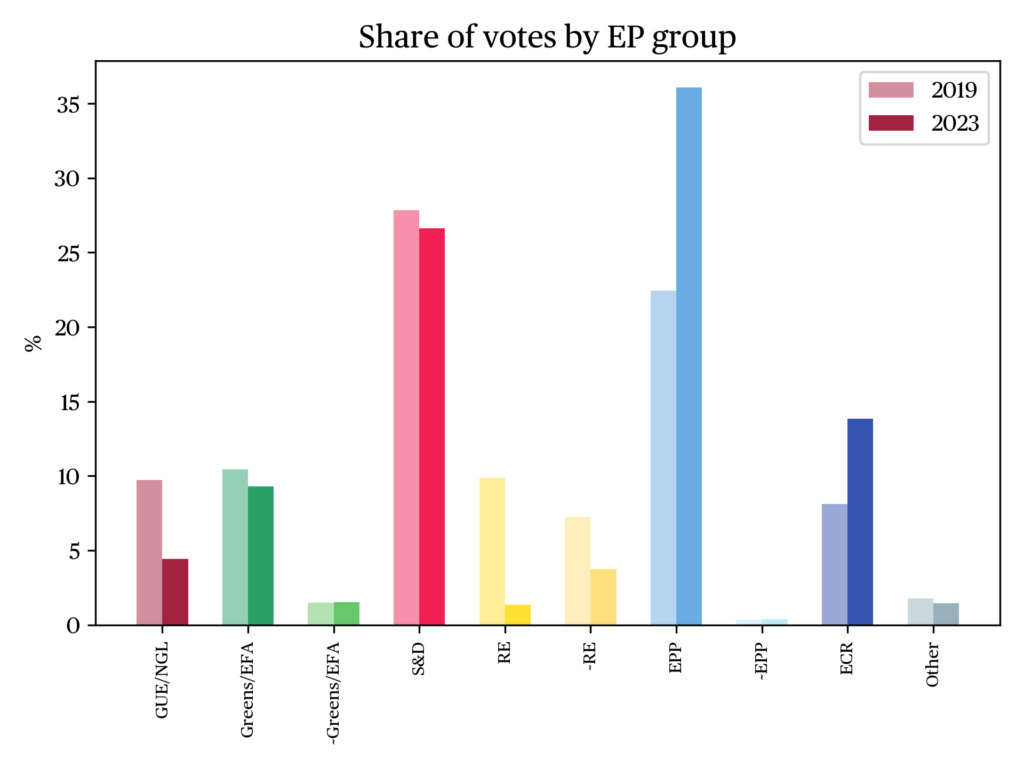
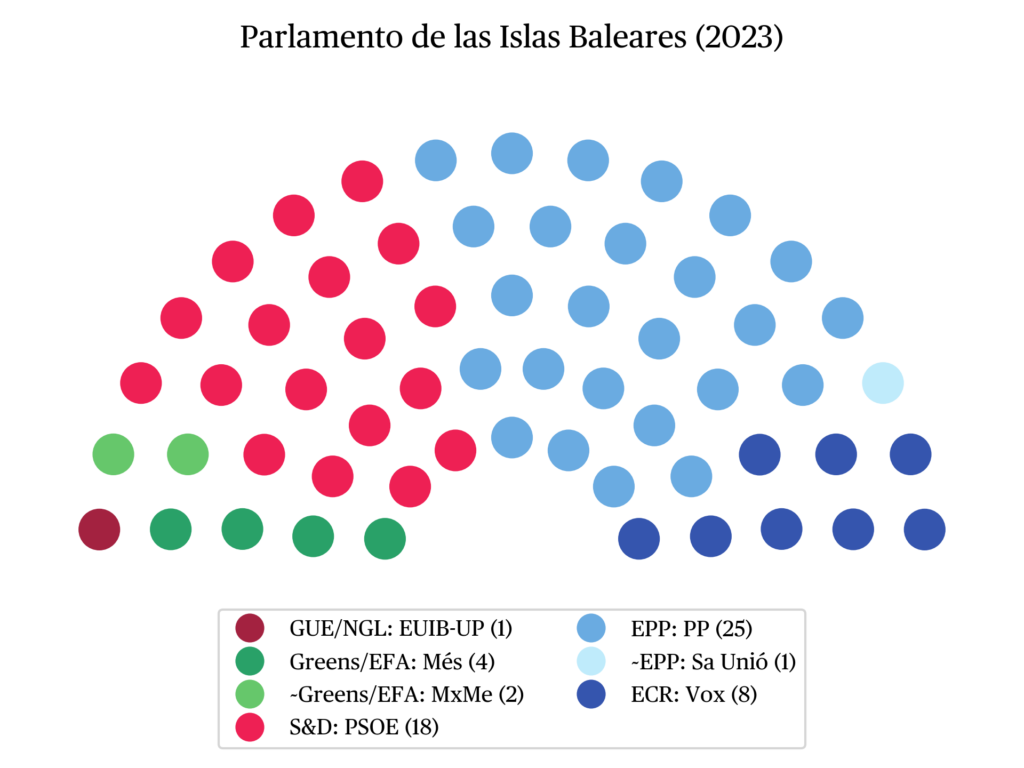
References
Alonso, S., Gómez, B., & Cabeza, L. (2013). Measuring Centre–Periphery Preferences: The Regional Manifestos Project. Regional and Federal Studies, 23(2), 189-211.
Anduiza, E., & Rico, G. (2022). Sexism and the Far-Right Vote: The Individual Dynamics of Gender Backlash. American Journal of Political Science.
El Pi. (2023). Persones com tu. 100 punts programàtics.
Font, J. (2001). Dangerous coalitions (for small parties): The electoral consequences of government in Spanish regions and municipalities. South European Society & Politics, 6(2), 71-96.
Diario de Mallorca (2023, 20 May). La izquierda pierde la mayoría en el Parlament y queda a expensas del Pi. Diario de Mallorca. Online.
Gómez, B., Alonso, S., & Cabeza, L. (2022). Regional Manifestos Project Dataset. Online.
Muñoz, J. (2012). La construcción política de la identidad española: ¿del nacionalcatolicismo al patriotismo democrático? Centro de Investigaciones Sociológicas. Volume 279.
Més per Mallorca. (2023). Més que paraules. Programa electoral.
Riera, P., Hernández, E., Riera, P., & Hernández, E. (2019). La competición política en las Islas Baleares, 1983-2015. De las demandas descentralizadoras a la importancia de la corrupción. En busca del poder territorial. Cuatro décadas de elecciones autonómicas en España. Madrid: CIS, 93-114.
Garmendia, A., & Riera, P. (2023). The nationalisation of subnational elections in polarised Spain: the May 2023 regional and local elections. South European Society and Politics.
Sánchez i Picanyol, J. (1998). Elecciones autonómicas en la Comunidad Balear. In Alcántara Sáez Árbol, M. & A. Martínez Rodríguez Árbol (eds.), Elecciones autonómicas en España, 1980-1997.
Partit Popular (2023). El cambio es ahora. Programa de gobierno.
Notes
- Més per Menorca, which would represent almost the same political space as its counterpart Més per Mallorca, must be included in this group. This party often obtains between 1 and 3 representatives in the regional Parliament, and it is mainly focused on the defense of the political and social interests of the residents of Menorca.
citer l'article
Llorenç Soler-Buades, Pedro Riera, Regional elections in the Balearic Islands, 28 May 2023, Jun 2024,
à lire dans cette issue
voir toute la revue





